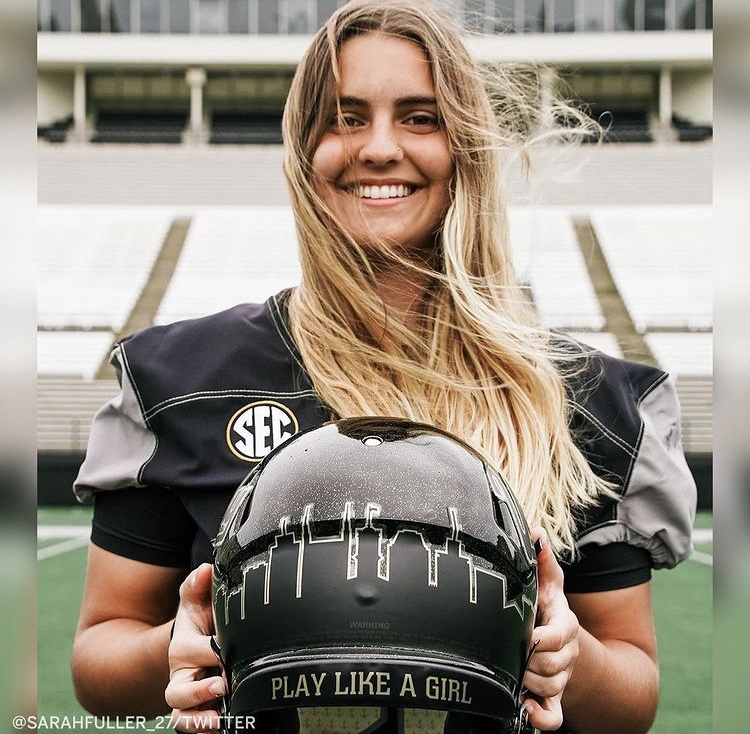Fuller leads fight to ‘Play Like a Girl’
Photo courtesy of @espn
Sarah Fuller in uniform repping her “Play Like a Girl” helmet
On Nov. 28 Sarah Fuller made his- tory by becoming the first woman to play football in a regular-season Power Five football game.
All of Vanderbilts’ kickers were forced to quarantine due to COVID-19 exposure, so as the starting goalkeeper on Vanderbilt’s only soccer team, Fuller seemed like the perfect replacement.
In an interview after the game, Fuller said, “It’s just so exciting that I can represent the little girls out there who wanted to do this or thought about playing football or any sport, really.”
The back of Fuller’s helmet featured the phrase “Play Like a Girl,” which is a nonprofit that encourages girls to play sports and get exposure to STEM opportunities.
Growing up, Fuller said that being told you “play like a girl” was considered an insult. But she wants to change this stigma: “Playing like a girl is a compliment; it’s something you want to strive for.”
In 2014, American feminine hygiene brand Always, came out with a commercial called #LikeAGirl that now has close to 70 million views on YouTube alone. They asked a handful of adults to perform a series of actions: run like a girl, fight like a girl, and throw like a girl. Each of them executed pathetic, dainty gestures which they believed resembled girls’ athletic abilities. A handful of young girls were then asked the same series of questions. Without hesitation, each girl showcased her abilities proving that skill is independent of gender and playing like a girl is a weak attempt at an insult.
As an avid athlete throughout my childhood, I too believed that I should be ashamed for “playing like a girl.” It wasn’t until I came across a quote by Mia Hamm that I realized I needed to take ownership and pride in being a female athlete. Hamm said, “My coach said I run like a girl, and I said if he ran a little faster he could too.”
This quote completely changed my perception of being a female athlete. I am a girl and that is not something I should be ashamed of; therefore, I am going to continue to play like a girl and run like a girl and throw like a girl, because that is who I am.
The barriers that Fuller tore down signaled a remarkable step in changing the stigma of women’s capabilities in sports. However, her performance was not met with full praise. Comments like “I can’t quit laughing at this! I hope she made them some cookies too!” and “Hope she gets broken in half” circulated around social media.
These nasty comments reveal nothing more than the insecurities of men who are fearful that women might take their spots in traditionally male-dominated roles. I hate to break it to these men, but as times continue to change, women like Fuller will continue to pave opportunities for themselves and their peers to enter positions in which they have previously been barred from.
There are people who do not want women to excel in sports and who believe women have no place on any field or court. This marks the deeply rooted systemic issue in our nation that women aren’t as capable or as worthy as men—an issue that transcends well beyond sports.
But as long as people keep jumping on opportunities and taking risks as Fuller did, this stereotype can slowly and gradually be resolved.

